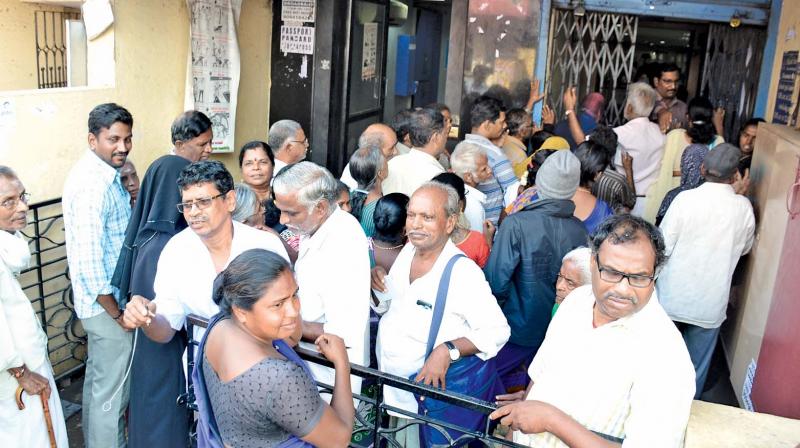Is our society moving towards being cashless?

Chennai: Over three weeks after the demonetisation move made its pinch felt across all strata of the society, despite the long queues at banks and ATMS, and hassles of the cash crunch, people have found alternative means to deal with payments and cash crunch.
“It was difficult initially but many of us are also planning to buy card swiping machines as we don’t want to lose customers,” said a merchant at Saidapet.
Nishita Kumar, a frequent cab traveller, was up for a shock when due to a glitch, she was asked to pay by cash for a ride she wanted to pay by card for.
“I reached my destination and told the driver to connect to the Uber customer care as I was short of cash, and the card option couldn’t be selected after hiring a ride,” she told Deccan Chronicle.
“I was in a hurry for a meeting and the cab driver was understanding. He completed the ride and gave me his account details, asking me to transfer the money to his account after I was done with the meeting,” she added. “That moment money transfer came to the rescue of both of us unlike most cases where cab drivers prefer getting paid in cash. And also, I met a good samaritan in the cab driver!” she continued about the experience.
Rural areas are living and trading on credit to ease the experience for people until cash flow into the banks and among people smoothens.
E-wallets good solution for cashless economy, but cyber security needed
Opposition parties and trading business communities have been, weeks later, demonising the demonetisation move which is an inevitable step towards replacing the currency of citizens with e-wallets, thereby minimising the evils of black money, fake currency, terror funding and tax evasion.
“Digital payments are the future and this move by the government has come as an empowering tool for the poor people to see rich people stashing money getting affected,” said K. Srinivasan, founder of Digital Journalists Association of India (DiJAI).
“Change is always uneasy. If we wait for the right time to make a move, that time will not come. Such is this move, that people will be forced to move towards newer modes of currency exchange,” he added.
What the government needs to work towards, he added, is the introduction of cheaper and newer schemes for small traders and vendors. “Banks have their own agendas, based on which they serve the well-heeled people. Small vendors end up paying huge interests to money lenders as banks don’t lend them money,” he said.
Cyber law advocate, V. Rajendran, hails the move by the PM but feels that before the announcement, the government should have started encouraging POS (Point-of-sale) machines and helped provide easy loans to manufacturers wanting to avail those.
“All this would have ended the brouhaha over the '2,000 notes which are not finding much acceptance everywhere,” he continued. Instead of letting private players like Paytm take over digital payments, public sector banks should strengthen their presence as the latter has more credibility, he opined.
“e-Wallets consist of payment through a virtual account, which contains a certain sum transferred from an existing bank account or a debit/ credit card. Security is not a concern here, as this account contains a few thousands of money compared to the remaining huge amount in our bank account,” he said, talking about e-wallets.
He added that Unified Payment Interface (UPI) should have been proved to be a boon but it wasn’t given the needed push by Reserve Bank of India. “UPI enables offline and online transfer of money between two accounts using a smartphone–for payments, fund transfers, bills – using an MPIN without hassle of creating a virtual accounts,” he added.
It could have been a game changer by National Payments Corporation of India, but did not become one, he noted. Experts feel that this is a move that the government and people need to accept and work towards. “Rupay cards should be promoted instead of Visa and MasterCard and debit card charges should be made zero for merchants in order to make the economy cashless,” said J. Prasanna, Director, Cyber Security and Privacy Foundation PTE Ltd.
Speaking about the security concerns, he added that risk with e-payments is high due to the current level of cyber security of banks, payment wallets and online infrastructure, making India still not ready to move towards digital payment. “Instead of promoting e-wallets and Paytm for smaller values of payments, POS machines should be provided to merchants,” he added. He added that the youth should teach the ones who don’t know about technology.

